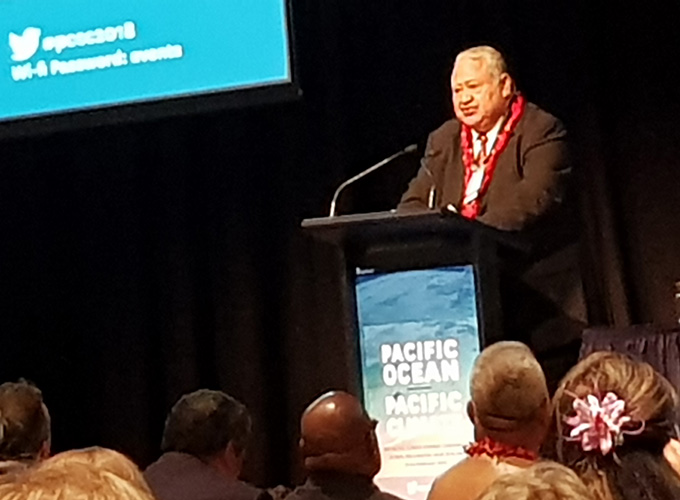By Nanette Woonton at Te Papa
The stark realities of climate change were laid bare at the opening of the Pacific Ocean, Pacific Climate Conference in Wellington last week.
Calls from the Prime Minister of Samoa for urgent action were made as climate change is put under the microscope during the conference.
Coordinated by the Victoria University of Wellington in partnership with the Secretariat of the Pacific Regional Environment Programme (SPREP) the three-day conference brought together different voices spanning a range of sectors for a diverse discussion on climate change and an exchange of ideas on how to address this issue together.
The conference scene was set with Samoan Prime Minister Tuila’epa Dr Sa’ilele Malielegaoi presenting the opening keynote address on Wednesday, highlighting the challenges of climate change across Samoa and the Pacific, and showcasing the action undertaken to address these.

“We all have a role to play in seeking the greatest level of ambition from all parties to the Paris Agreement. We understand that there are challenges for all countries but through cooperation, understanding and good faith, we can overcome these,” said Prime Minister Tuila’epa.
“Promises are not enough, now is the time for action and we must all act now.”
The actions of Samoa both in climate change adaptation and mitigation were highlighted, helping to empower discussions over the days ahead.
100% renewable energy
Samoa has a target of generating 100 percent of its electricity from renewable energy sources by 2025, taking into account the anticipated increase in electricity demand.
In its commitment to climate action, Samoa is also preserving its biodiversity, ensuring mangroves as crucial marine ecosystems are conserved and protected, in turn helping to strengthen resilience against the impacts of climate change.
Samoa is also working to keep its waters clean and healthy from land-based pollution with legislation and regulations. Around 80 percent of marine debris is from land-based sources, all of which present a threat to Samoa’s marine wildlife.
“Pacific Island countries face numerous challenges with sustainable development. We are small in size and population. We have small markets and limited trade. We are remote and our resource bases are limited,” said Prime Minister Tuila’epa.
“Yet we have so much to be proud of. Pacific Island countries have made significant steps forward, and despite our challenges, our economies are growing. We are implementing innovative adaptation measures against climate change impacts.
“We made considerable progress in moving our economies towards renewable energy, despite being responsible for a very, very, very tiny proportion of greenhouse gas emissions.”
For the next three days there was much discussion and exchange of ideas as the momentum gained to tackle climate change together as members of a Pacific and global community were propelled forward by words of empowerment from the Prime Minister of Samoa.
Global outlook needed
“The recognition of our earth without borders resonates with the need for a global outlook, international cooperation and a shared strategy to address the challenges we face, after all as the Prime Minister of Tuvalu always ardently advocates – Save Tuvalu and you will save the world.”
The Pacific Ocean, Pacific Conference is the second Pacific Climate Change Conference held at Te Papa Museum from February 21-23.
The parallel sessions consisted of a range of presentations held under different themes from different speakers. Each day started with two keynote addresses as well as another two keynote addresses after lunch.
Nanette Woonton is communications officer of the Secretariat of the Pacific Regional Environment Programme (SPREP).







